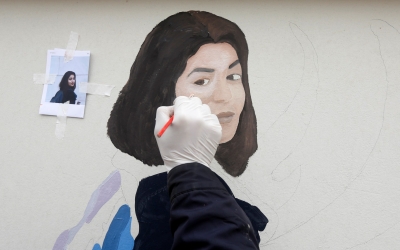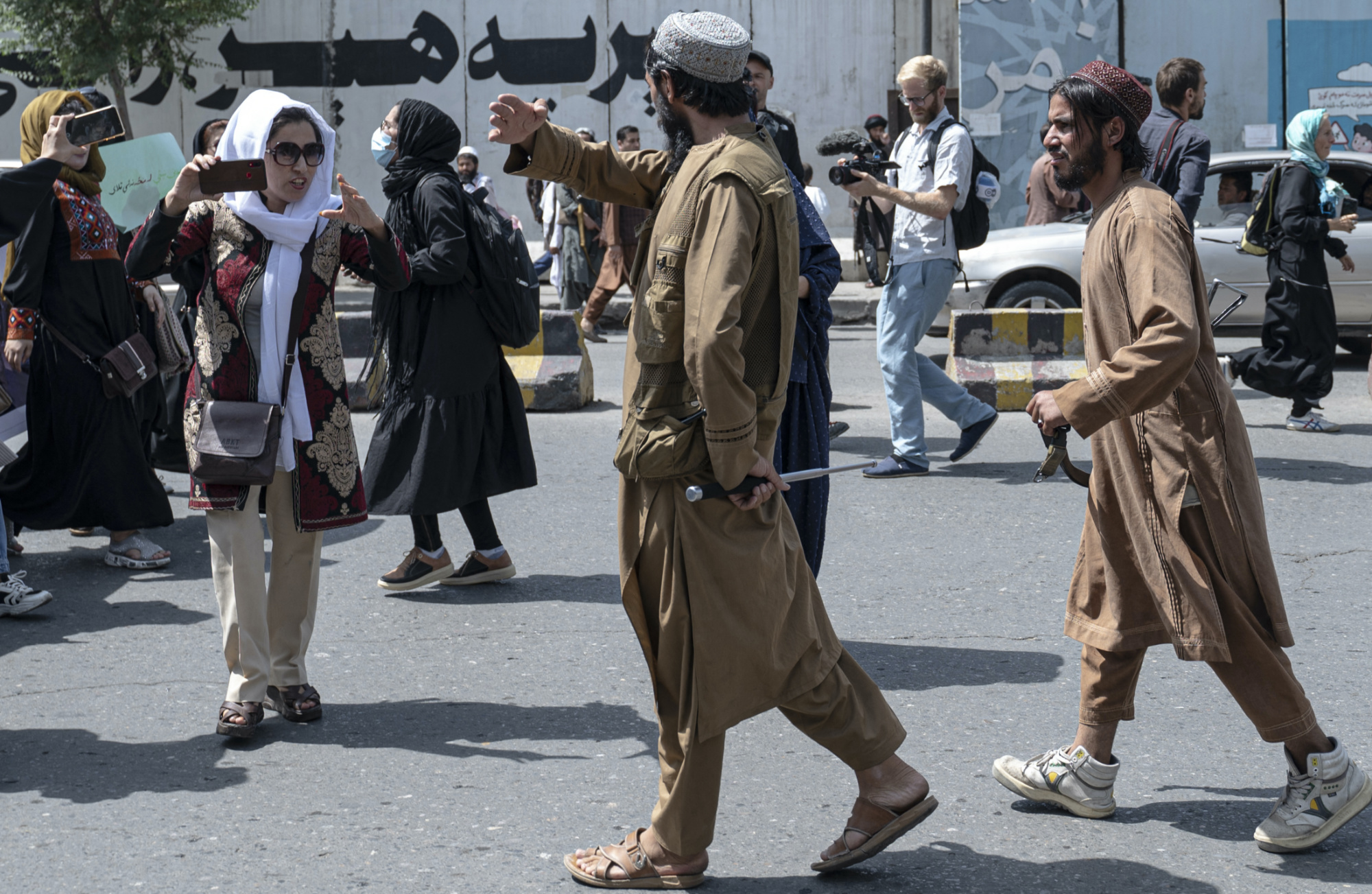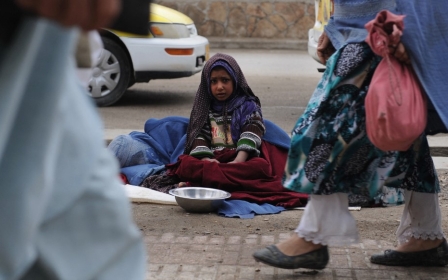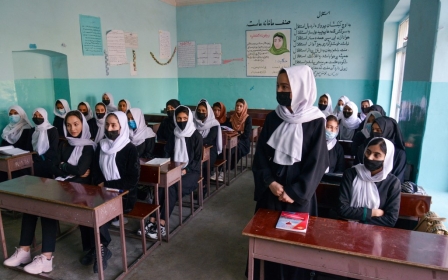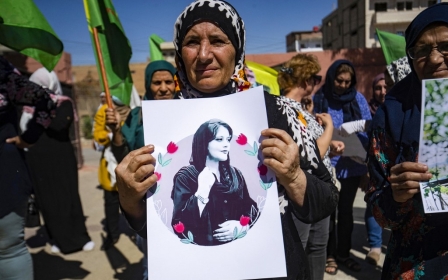Mahsa Amini: Afghan women see own struggle for rights in Iran protests
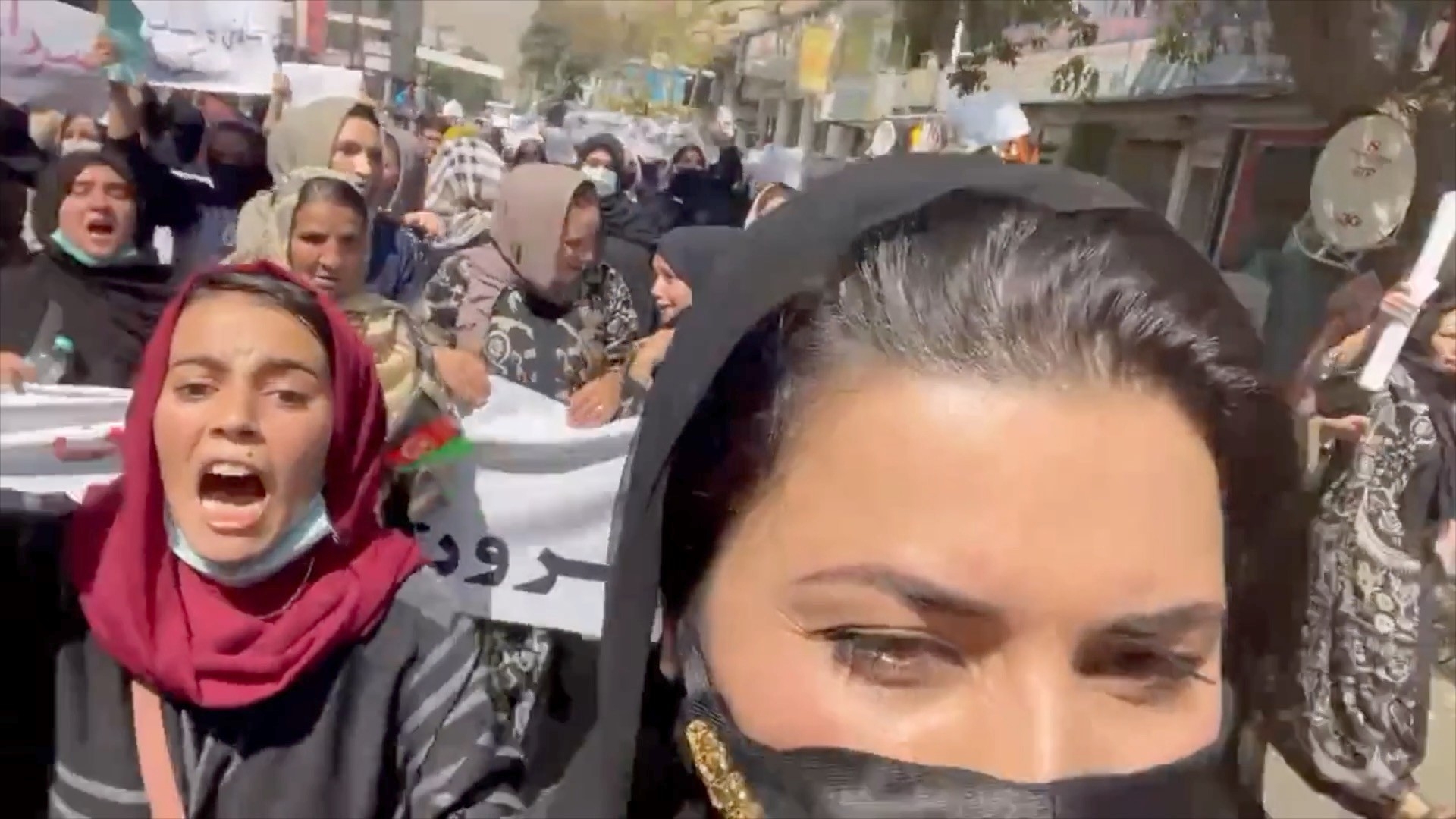
Karima Katayon first heard the name Mahsa Amini on the radio in Kabul. She was in a car with a friend, another young woman in her 20s, and both were moved by the reports of thousands of men and women across Iran taking to the streets to protest against the death of the 22-year-old while in police detention on charges of not adhering to the Islamic Republic’s dress code.
The 26-year-old entrepreneur was not alone. Afghans inside and outside the country started to follow the reports of protests that eventually grew into a movement calling for reform, or even the downfall of the ruling clerics.
'If the men of Afghanistan stood by their women, no group, not the Taliban, not the Islamic State, no one could force such rules on us'
- Karima Katayon, Afghan entrepreneur
As she followed the reports, Katayon says she was both moved and disappointed, “I thought to myself, ‘Good for the people of Iran, men and women are standing up for their rights together.’”
But as hopeful as she was for the people of Iran, Katayon felt a deep sadness for the Afghan people, who have been subject to the Taliban’s so-called Islamic Emirate for the past year.
“I wasn’t sad to be an Afghan on 15 August, but over these [past] weeks, listening to reports of Iranian men and women standing up together, it was the first time I was disappointed by my own people,” she says, referring to the day in 2021 when former President Ashraf Ghani fled the country and the Taliban returned to power after a 20-year insurgency.
New MEE newsletter: Jerusalem Dispatch
Sign up to get the latest insights and analysis on Israel-Palestine, alongside Turkey Unpacked and other MEE newsletters
Katayon says watching videos of Iranian men cutting their hair in solidarity with women who had done the same in an act of resistance to the government’s guidelines on women’s dress, she wished more Afghan men would take to the streets in defence of their women and girls.
'Where are the men?'
Since the Taliban returned to power last August, teenage girls in 32 of Afghanistan's 34 provinces have been unable to attend high school. Additionally, most women have been barred from returning to their government jobs, aside from a handful of ministries and directorates that have allowed their return.
There have been small protests by women across several cities over the last year, but they have been exclusively female and have repeatedly come under attack by Taliban authorities.
Mobile phone footage captured at the site of several protests has shown the Taliban firing into the air and chasing away both the demonstrators and journalists covering the gatherings. Female protesters have also accused Taliban forces of lobbing tear gas at them.
“Where are the men?” Katayon says before answering her own question.
“The truth is, our problems didn’t start with the Taliban,” Katayon says of life as a single, educated young woman who has been living in the capital since 2018.
“Look, 50, maybe 60 percent of my fear is with the Taliban, but the rest is with the people themselves. Believe me, if the men of Afghanistan stood by their women, no group, not the Taliban, not the Islamic State, no one could force such rules on us.”
Afghan men have tried to defend their daughters’ rights to education.
Last month, men in the southeastern province of Paktia took to the streets after the Taliban reclosed five girls' high schools they had managed to briefly reopen.
Within days, elders in Kandahar, where the Taliban’s leadership is based, also called on girls' secondary schools to reopen in the southern province. Similar calls have also been made by officials in Parwan province, just north of Kabul.
But female activists say more needs to be done, that Afghan men need to make their presence felt more.
Zholia Parsi has partaken in several protests calling on the Taliban to give back the rights to education and work for all girls and women across Afghanistan. She laments that men have yet to stand side by side with women in demanding their “basic” rights, but she says the situation in Taliban-controlled Afghanistan is very different from Iran.
“The women of Afghanistan are currently busy asking for basic things. The right to education for teenage girls. The right to work for all women. The right to travel without fear. We have a long way to go before we can do what the women of Iran are doing,” Parsi says.
On Thursday, around 25 Afghan women protested in front of the Iranian embassy in Kabul in support of protests in Iran, chanting "Women, life, freedom", the mantra used by Iranians, before Taliban forces fired into the air and dispersed them.
When men and women have protested in Afghanistan, they faced imprisonment, abuse and torture at the hands of the Taliban. Last August, within days of the Taliban’s return to power, three young men in the eastern city of Jalalabad were killed when they tried to raise the traditional tri-color flag in place of the Taliban’s black-and-white one.
Because of this, Parsi and Katayon say the Afghan people have found their own way to protest the Taliban’s limitations on daily life – by returning to a semblance of their normal lives.
'I won't change for them'
When the Taliban announced that all women must cover their faces and wear either the all-encompassing black Arab-style niqab or the local blue chadari, or burqa, last May, Parsi initially joined in a women’s protest that was quickly broken up by the Taliban. But she wouldn’t let the Taliban’s brute force stop her from expressing herself.
“I went back on the streets dressed as I always did, I even took out my phone and went live to show everyone that Afghan women cannot be told what a hijab is or is not by others,” Parsi says of the increasing numbers of men and women who have tried to return to their normal style of dress in the nation’s urban centres.
“Just by going out dressed as we always have is a form of protest. We want the Taliban to know that they either have to change themselves, or they have to accept Afghanistan as it is, there is no other choice,” Parsi says.
Katayon agrees.
She has made it a point to travel across the country and post pictures and videos showing her living her life as normally as possible to her 15,000 Instagram followers.
'When we protested, we didn’t protest the hijab. We protested the requirement of a chadari or a niqab, we know what Islam is. We know how to dress'
- Zholia Parsi
“Fear of the Taliban can’t send us into hiding, I’ve worked, I’ve studied. I can’t stop living my life because of them,” Katayon says of what gives her the courage to go out dressed as she usually would in a city where Taliban authorities have plastered signs dictating what women can and cannot wear.
Parsi says Afghan women, who are by and large Muslim, do not want their religion dictated to them by strange men.
“When we protested, we didn’t protest the hijab. We protested the requirement of a chadari or a niqab, we know what Islam is. We know how to dress,” she says.
Parsi admits that she has been stopped by Taliban forces, but has so far not faced physical harm.
“They’ve stopped me and called me names. They have insulted me for what I wear, but I won’t change who I am for them. They must know that I am an Afghan. I am a Muslim. This is how I dress,” she says.
A female teacher in Kabul, who did not wish to be named, agrees with Parsi’s assessment. She says that unlike in Iran, Afghan women are not against the hijab, they just want their fundamental rights.
“Whatever they’ve done to us, taken our girls’ education, our right to work, the women of Afghanistan have never said they don’t want the hijab,” the teacher says.
“We are Muslim, we have no issue with the hijab. We never will. Our issue is what is rightfully ours, our ability to be part of our society without restriction.”
Middle East Eye delivers independent and unrivalled coverage and analysis of the Middle East, North Africa and beyond. To learn more about republishing this content and the associated fees, please fill out this form. More about MEE can be found here.


